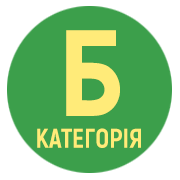QUESTIONNAIRE AS A TECHNOLOGY FOR MEASURING THE QUALITY OF EDUCATIONAL SERVICES IN HIGHER EDUCATION
Abstract
Justification of the theoretical and methodological foundations of the internal assessment of the quality of specialist training in institutions of higher education monitoring of such activities is now an extremely relevant educational task. Such an assessment is necessary for identifying problematic issues of the educational process and formulating recommendations for its improvement. The article substantiates the experience of using questionnaires as tool for internal assessment of the quality of training of higher education applicants on the example of Lesya Ukrainka Volyn National University. The system of internal quality assurance of higher education is based on such principles as academic freedom, autonomy and self-regulation; openness to new knowledge and criticism; honesty and tolerance towards all team members and stakeholders; mutual demand and trust; initiative and leadership; public and individual responsibility for work results; inclusivity educational environment: universal design and intelligent adaptation. The organization of the system of internal quality assurance of higher education at Lesya Ukrainka Volyn National University includes conducting questionnaires in three directions. At the first level, a sociological survey of first-year students “Social adaptation of first-year students to the educational process at higher education institutions” is conducted, and an online survey of all applicants “Education through the eyes is conducted students”. Based on the results of the survey, a portrait of the first-year student is drawn, and the proposals of those seeking education to improve educational activities in higher education institutions are substantiated. The second-level questionnaire is conducted at the faculties within the framework of the chosen specialties, the third level – after the completion of the study of individual educational components (the opinion of the students of education is taken into account regarding the preparation of the teacher for classes and his punctuality, availability of educational material and effectiveness of teaching methods). According to the results of the survey, specific proposals for improving the quality of the educational process are provided to deans of faculties, heads of departments, guarantors of educational programs and curators of academic groups.
References
2. Моніторинг якості освіти. URL: http://surl.li/pmsw.
3. Навчально-методичний відділ забезпечення якості вищої освіти у Волинському національному університеті імені Лесі Українки. URL: http://surl.li/dfzpk.
4. Пілов П.І., Свіжевська С.А. Анкетування як механізм моніторингу задоволеності внутрішніх споживачів освітнього процесу. URL: http://surl.li/qtpwc.
5. Положення про систему внутрішнього забезпечення якості вищої освіти у Волинському національному університеті імені Лесі Українки. URL: http://surl.li/beuct.






